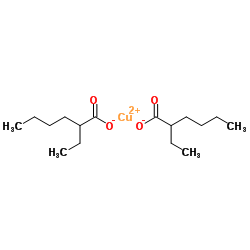149-11-1
| Name | Cupric 2-ethylhexanoate |
|---|---|
| Synonyms |
Copper(II) octoate
Copper bis(2-ethylhexanoate) Copper (II)-2 ethylhexanote Copper(II) 2-ethylhexanoate,16-Cu Hexanoic acid, 2-ethyl-, copper(2+) salt (2:1) Copper isocaprylate COPPER 2-ETHYLHEXANOATE MFCD00015695 EINECS 205-731-0 UNII:FN4Z5UVG6L Bis(2-ethylhexanoic acid)copper(II) salt Copper(2+) bis(2-ethylhexanoate) COPPER(II) 2-ETHYLHEXANOATE Hexanoic acid,2-ethyl-,copper(2++) salt |
| Melting Point | 252ºC |
|---|---|
| Molecular Formula | C16H30CuO4 |
| Molecular Weight | 349.953 |
| Flash Point | 116.6ºC |
| Exact Mass | 349.144012 |
| PSA | 37.30000 |
| LogP | 2.28490 |
| Storage condition | 2~8℃ |
|
Section 1: Product Identification Chemical Name:Copper (II) 2-ethylhexanoate (solvent free - 16-19% Cu) CAS Registry Number:149-11-1 Formula:Cu[OOCCH(C2H5)C4H9]2 EINECS Number:205-731-0 Chemical Family:metal carboxylate Synonym:copper-2-ethylcaproate, 2-ethylcaproic acid, copper salt.
Section 2: Composition and Information on Ingredients IngredientCAS NumberPercentACGIH (TWA)OSHA (PEL) Title Compound149-11-1100%no datano data Section 3: Hazards Identification Emergency Overview:Irritating to the respiratory tract, skin and eyes. May be harmful if swallowed. Primary Routes of Exposure:Ingestion Eye Contact:Causes slight to mild irritation of the eyes. Skin Contact:Causes slight to mild irritation of the skin. Inhalation:Irritating to the nose, mucous membranes and respiratory tract. Ingestion:Ingestion may lead to dizziness, abdominal cramps, vomiting, bloody diarrhea, weakness, and convulsions. Irritating to skin, eyes and respiratory tract. Ingestion of large amounts of copper salts can cause vomiting, Acute Health Affects: dizziness, exhaustion, coma, and death. Chronic Health Affects:Ingestion or inhalation of copper compounds may cause liver and kidney disease. NTP:No IARC:No OSHA:No SECTION 4: First Aid Measures Immediately flush the eyes with copious amounts of water for at least 10-15 minutes. A victim may need Eye Exposure: assistance in keeping their eye lids open. Get immediate medical attention. Wash the affected area with soap and water. Remove contaminated clothes if necessary. Seek medical Skin Exposure: assistance if irritation persists. Remove the victim to fresh air. Closely monitor the victim for signs of respiratory problems, such as difficulty Inhalation: in breathing, coughing, wheezing, or pain. In such cases seek immediate medical assistance. Ingestion:Seek medical attention immediately. Keep the victim calm. Give the victim water (only if conscious). SECTION 5: Fire Fighting Measures Flash Point:not applicable Autoignition Temperature:none Explosion Limits:none Extinguishing Medium:carbon dioxide, dry powder or foam If involved in a fire, fire fighters should be equipped with a NIOSH approved positive pressure self-contained Special Fire Fighting Procedures: breathing apparatus and full protective clothing. Hazardous Combustion andIf involved in a fire this material may emit toxic organic fumes. Decomposion Products: Unusual Fire or Explosion Hazards: No unusual fire or explosion hazards. SECTION 6: Accidental Release Measures Spill and Leak Procedures:Small spills can be mixed with vermiculite or sodium carbonate and swept up. SECTION 7: Handling and Storage Handling and Storage:Store in a sealed container. Keep away from heat and moisture. SECTION 8: Exposure Controls and Personal Protection Eye Protection:Always wear approved safety glasses when handling a chemical substance in the laboratory. Skin Protection:Wear appropriate chemical resistant gloves and protective clothing. Ventilation:Material may form a fine dust. If possible, handle the material in an efficient fume hood. If in form of fine dust and ventilation is not available a respirator should be worn. The use of respirators Respirator: requires a Respirator Protection Program to be in compliance with 29 CFR 1910.134. Ventilation:Material may form a fine dust. If possible, handle the material in an efficient fume hood. Additional Protection:No additional protection required. SECTION 9: Physical and Chemical Properties Color and Form:blue pwdr. Molecular Weight:349.96 Melting Point:no data Boiling Point:no data Vapor Pressure:no data Specific Gravity:no data Odor:none Solubility in Water:insoluble SECTION 10: Stability and Reactivity Stability:air and moisture stable solid Hazardous Polymerization:no hazardous polymerization Conditions to Avoid:none Incompatibility:Oxidizing agents Decomposition Products:Carbon dioxide, carbon monoxide, organic vapors, and metal oxides and carbonates. SECTION 11: Toxicological Information RTECS Data:No specific information available on this product. Carcinogenic Effects:No data available Mutagenic Effects:No data available Tetratogenic Effects:No data available SECTION 12: Ecological Information Ecological Information:No information available SECTION 13: Disposal Considerations Disposal:Dispose of according to local, state and federal regulations. SECTION 14: Transportation Shipping Name (CFR):Non-hazardous Hazard Class (CFR):NA Additional Hazard Class (CFR):NA Packaging Group (CFR):NA UN ID Number (CFR):NA Shipping Name (IATA):Non-hazardous Hazard Class (IATA):NA Additional Hazard Class (IATA):NA Packaging Group (IATA):NA UN ID Number (IATA):NA SECTION 15: Regulatory Information TSCA:Listed in the TSCA inventory. SARA (Title 313):Title Compound: See Category Code N100 for reporting. Second Ingredient:none SECTION 16 - ADDITIONAL INFORMATION N/A |
| Symbol |

GHS07 |
|---|---|
| Signal Word | Warning |
| Hazard Statements | H315-H319-H335 |
| Precautionary Statements | P261-P305 + P351 + P338 |
| Personal Protective Equipment | dust mask type N95 (US);Eyeshields;Gloves |
| Hazard Codes | Xi:Irritant; |
| Risk Phrases | R36/37/38 |
| Safety Phrases | S26-S37/39 |
| RIDADR | NONH for all modes of transport |
| WGK Germany | 3 |

